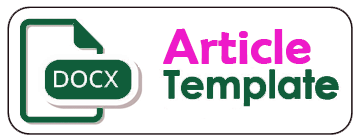ANALISIS EFESIENSI PEMANFAATAN MODAL KERJA DALAM PENGELOLAAN PT. PELABUHAN INDONESIA IV (PERSERO) CABANG MAKASSAR
DOI:
https://doi.org/10.33506/sl.v7i1.107Keywords:
Pemanfatan Modal Kerja, PengelolaanAbstract
Tujuan penelitian ini, 1) Untuk menganalisis keadaan sumber dan penggunaan modal kerja
yang dimiliki untuk menghasilkan Sisa Hasil usaha pada Koperasi Karyawan PT Pelabuhan
Indonesia IV (Persero) Cabang Makassar. 2) Untuk menganalisis efektivitas pemanfaatan
modal kerja dalam mencapai Laba Usaha pada Koperasi Karyawan PT Pelabuhan Indonesia
IV (Persero) Cabang Makassar.Penelitian ini merupakan jenis penelitian kuantitatif dengan
Teknik analisis kuantitatif adalah analisis dengan menggunakan cara sebagai berikut : 1)
analisis sumber dan penggunaan dana (Munawir, 1999:97) dan analisis rentabilitas digunakan
metode analisis rentabilitas seluruh modal dan rentabilitas modal.Hasil penelitian
menunjukkan tahun 2014 sebesar 124,55% dan pada tahun 2015 sebesar 77,80% ini berarti
bahwa setiap hutang lancar Rp. 1,00 dijamin oleh quick ratio assets Rp. 124,55% untuk tahun
2014 dan setiap hutang lancar Rp. 1,00 dijamin oleh quick ratio sebesar Rp. 77,80 untuk
tahun 2015. Sedangkan Hasil perhitungan rasio menunjukkan tahun 2014 sebesar 124,55%
dan pada tahun 2015 sebesar 77,80% ini berarti bahwa setiap hutang lancar Rp. 1,00 dijamin
oleh quick ratio assets Rp. 124,55% untuk tahun 2014 dan setiap hutang lancar Rp. 1,00
dijamin oleh quick ratio sebesar Rp. 77,80 untuk tahun 2015.
References
Ahmad, K. 1998. Dasar – Dasar Manajemen Modal kerja, Rineka Cipta, Jakarta
Djarwanto. Ps. 2002. Pokok-Pokok Analisis Laporan Keuangan. BPFE,
Donald E. Kieso dan Jerry J. Weygandt, 2000, Intermediate Accounting, Eight Edition, (New York: John Wiley and sons
Harahap, S.S, 1999. Analisa Kritis atas Laporan Keuangan, Radja Grafindo Persada, Jakarta.
Harjito, A. 2004, Manajemen Keuangan, Edisi I, Cetakan Keempat, Ekonisia, Yogyakarta.
Harnanto 2002, Akuntansi Keuangan Intermediate, Edisi Kedua Penerbit Liberty Yogyakarta,
Hartanto, S. 2005. Pembelanjaan Badan Usaha (Dasar-Dasar Manajemen keuangan) Liberty, Yogyakarta
Hanafi, M.M dan Halim, A. 2002, Analisis Laporan Keuangan. UPP AMP YKPN, Yogyakarta.
Husnan,S. 2002. Manajemen Keuangan, Teori dan Penerapan ( Keputusan Jangka Pendek). Jilid II, Edisi keempat. BPFE, Yogyakarta.
Martono, S. 2004, Manajemen Keuangan, Edisi I, Cetakan Keempat, Ekonisia, Yogyakarta.
Munawir, 2004. Analisa Laporan Keuangan. Liberty, Yogyakarta.
Muslich, M. 2000. Manajemen Keuangan, Analisis, Perencanaan dan Kebijaksanaan. Bumi Aksara, Jakarta
Raka I.G.R, 2003. Pengantar Pengetahuan Koperasi, Departemen Koperasi dan Akademi Koperasi, Denpasar
Riyanto, 2003. Pembelanjaan Perusahaan. Yayasan Penerbit Gajah Mada, Yogyakarta
Reksohadiprodjo.S, 2005. Management Koperasi, BPFE, Yogyakarta
Soemarso, 2002. Akuntansi Suatu Pengantar. Salemba Empat, Jakarta
Sunindhia, dkk, 2002. Koperasi dan Perekonomian Indonesia, Bina Aksara, Jakarta.
Tunggal, A. W, 2000. Dasar Dasar Analisa Laporan Keuangan, Cetakan I, Rineka Cipta Jakarta.
Van Horne, 2002. Manajemen Keuangan. BPFE, Jakarta
Downloads
Published
How to Cite
Issue
Section
License
Please find the rights and licenses in Sentralisasi. By submitting the article/manuscript of the article, the author(s) agree with this policy. No specific document sign-off is required.
1. License
The non-commercial use of the article will be governed by the Creative Commons Attribution license as currently displayed on Creative Commons Attribution-NonCommercial-ShareAlike 4.0 International License.
2. Author(s)' Warranties
The author warrants that the article is original, written by the stated author(s), has not been published before, contains no unlawful statements, does not infringe the rights of others, is subject to copyright that is vested exclusively in the author, and free of any third party rights, and that any necessary written permissions to quote from other sources have been obtained by the author(s).
3. User/Public Rights
Sentralisasi's spirit is to disseminate articles published are as free as possible. Under the Creative Commons license, Sentralisasi permits users to copy, distribute, display, and perform the work for non-commercial purposes only. Users will also need to attribute authors and Sentralisasi on distributing works in the journal and other media of publications. Unless otherwise stated, the authors are public entities as soon as their articles got published.
4. Rights of Authors
Authors retain all their rights to the published works, such as (but not limited to) the following rights;
- Copyright and other proprietary rights relating to the article, such as patent rights,
- The right to use the substance of the article in own future works, including lectures and books,
- The right to reproduce the article for own purposes,
- The right to self-archive the article (please read our deposit policy),
- The right to enter into separate, additional contractual arrangements for the non-exclusive distribution of the article's published version (e.g., post it to an institutional repository or publish it in a book), with an acknowledgment of its initial publication in this journal (Sentralisasi).
5. Co-Authorship
If the article was jointly prepared by more than one author, any authors submitting the manuscript warrants that he/she has been authorized by all co-authors to be agreed on this copyright and license notice (agreement) on their behalf, and agrees to inform his/her co-authors of the terms of this policy. Sentralisasi will not be held liable for anything that may arise due to the author(s) internal dispute. Sentralisasi will only communicate with the corresponding author.
6. Royalties
Being an open accessed journal and disseminating articles for free under the Creative Commons license term mentioned, author(s) aware that Sentralisasi entitles the author(s) to no royalties or other fees.
7. Miscellaneous
Sentralisasi will publish the article (or have it published) in the journal if the article editorial process is successfully completed. Sentralisasi's editors may modify the article to a style of punctuation, spelling, capitalization, referencing, and usage that deems appropriate. The author acknowledges that the article may be published so that it will be publicly accessible and such access will be free of charge for the readers as mentioned in point 3.









